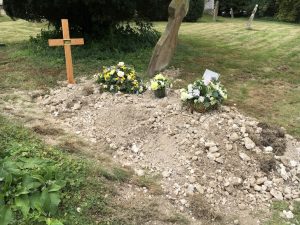 On Tuesday, in our little village, we laid a Son of the Soil to rest. I was asked to give a eulogy. It is always difficult but when it is the end of an era it is all the more poignant. I have reproduced some of what I said here, not as some sort of self-promotion, but as a testament to John C…
On Tuesday, in our little village, we laid a Son of the Soil to rest. I was asked to give a eulogy. It is always difficult but when it is the end of an era it is all the more poignant. I have reproduced some of what I said here, not as some sort of self-promotion, but as a testament to John C…
We are here today not only to say ‘goodbye’ to John, but to mark the end of an era.
Many folk in this modern world would find it unimaginable for somebody to spend their whole life in one place, working on the same farm.
That is what John C. did. He arrived in the village aged 18 months when his father got a job on the neighbouring farm to here with my great-uncle who was the tenant. He left only a few weeks ago when he was overtaken by illness aged 91.
John loathed modernity. He never had need of a passport or used a computer and only considered a phone when his mother became ill.
He was a skilled ploughman and was of that first generation to cross from using horse-power to tractor-power.
He was as much a part of the farm as the ashes, oaks and Hornbeam trees in the woods. He took pride in the local history and surroundings, loving those areas on the farm unseen by most but loved by him.
He was a great story-teller.
Two of his favourites include explosions…
Story One
During the early stages of the Second World War a team arrived with traction engines to plough up a field on the farm that had been pasture since time immemorial. One traction engine was on the headland by the Great Wood and the other on the far side of the field. The plough was winched between the two by steel hawser. To get that bit of extra horsepower the men would tie down the safety valves with string. Both crews would meet for their beaver break (local terminology for mid morning snack) in the middle of the field.
One day a crew, during their beaver break, forgot to untie the string on the safety valve and the resultant explosion was heard for miles.
Thankfully nobody was hurt.
Story Two
During the latter days of the Second World War a V2 rocket landed on the farm. Because it was just over the brow of the hill, the resultant explosion only cracked windows on the cottages and farmhouse. However there were smashed windows over four miles away at Letchworth. You can still see the enormous hole in the hill today.
With much of modern farming, men arrive with massive machines with one aim: To reach the far corner of each field as quickly and efficiently as possible. Computers judge that efficiency by mapping everything from progress to yield. Operators may know the names of the fields and hectarage, but little else. The history and origins of those fields are superfluous to their needs. Without local men on the farm, particularly ploughman, whose progress across the fields was slow, we are losing that detailed knowledge of the land that has been handed-down over the generations.
We are saying goodbye to John today, a man who lived and understood the land that he worked, the whole of his working life was a testament to this green and pleasant land.
That is why this is the end of an era,
John was ‘The Last Ploughman in the Village’.
© Baldock Bard 2016
For more from the Baldock Bard click on ‘Home’ above
Facebook: Baldock Bard
Twitter: @baldockbard
E-mail: baldockbard@www.baldockbard.co.uk

